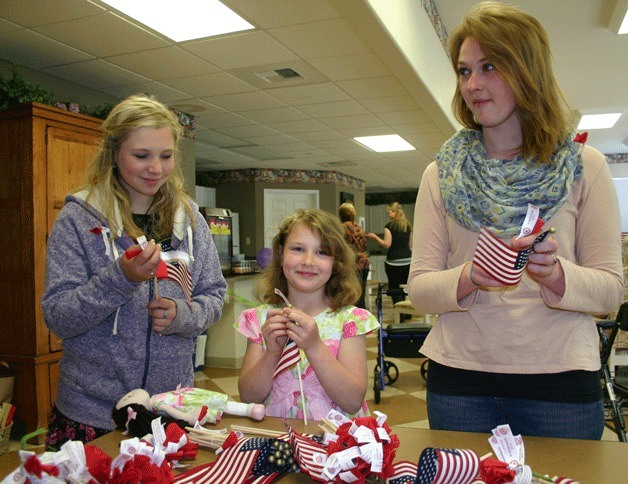A Poppy Girl learns that an assisted living facility isn’t just a place where older people live, it’s where an irreplaceable storehouse of history is kept alive in the memories of residents.
Wednesday, it was war stories that came out of the memory banks. People with white hair or no hair, some using canes and walkers, others a bit hard of hearing or dim of vision, told incredible stories while relishing poppy-decorated cupcakes.
This year’s South Whidbey American Legion Post 141 Poppy Girl is Anastasia Leese, age 6, a student in Mrs. Matthew’s first grade class at South Whidbey Elementary. She was assisted in pinning poppies to tiny U.S. flags and handing out cupcakes by Senior Poppy Girl Krista Drechsel, 15, and helper Kareena Moore, 18, both South Whidbey High School students. Overseeing it all was Libby McCauley, of the American Legion Auxiliary.
The visit to Maple Ridge Assisted Living in Freeland was the first Poppy Girl event preceding the Memorial Day ceremony at Bayview Cemetery. They’ll also be handing out red poppies and hoping for donations at the ferry docks May 18 and 19, among other activities. The poppies symbolize the call to remember those lost in war, as depicted in John McCrae’s immortal poem, “In Flanders Fields.”
Anastasia handed out the first poppy-embellished flag to Bill Iiles, 94, standing tall outfitted in his dress white Navy commander uniform from World War II. His bride of three years, Phyllis, stood proudly beside him.
Iiles was a Navy flyer, starting with PBY seaplanes, a staple at NAS Whidbey during the war. He was never station at Whidbey, instead he was sent to the Aleutian Islands. Then the Navy sent him to flight training for the DC-3, which he flew off Alaska, in the South Pacific and Europe, hunting down enemy submarines.
Iils spent 6,000 hours in the air in his Navy career, partly in the reserves after he entered civilian life as a teacher. “They’d pay me more to fly on weekends than to teach,” he said with a chuckle. 
He lived in several states during his life but moved to Whidbey when his grandson, Elijah Iles, was born. “We had to sell everything to move here,” he said. He’s glad he did, as he got to see Elijah graduate from high school last year. His son is David Iles, who lives only a short distance from Maple Ridge.
The senior Iiles is still healthy and in his uniform looks like he could take over an airplane’s controls tomorrow. “I went to the doctor yesterday and he said I’m in great shape,” he said. “April 8 is my birthday and I got my driver’s license renewed in Oak Harbor.”
He looked at the poppy as Anastasia handed it to him and another memory flashed back. “It reminds me more of World War I than anything,” he said. “A nephew of my dad’s never came back.”
Richard Drake, 93, was an Air Force staff sergeant in World War II, a flight engineer in China who once saw the legendary Lt. General Chennault of Flying Tigers fame. After spending “four years and five months in the service,” he returned home. He said he was the first commander of American Legion Post 141, in 1947.
Beverly Aldrich, 91, joined the U.S. Army Women’s Air Corps in 1942 in Des Moines, Iowa. “I wanted in with the cooks and bakers so they put me with the medics,” she laughed. Her dreams of helping the war effort overseas never came true. She spent her entire 2 1/2 years in Des Moines.
Winnie McLeod, 95, said her late husband, John, was the first man in Langley to receive a draft notice in 1941. “He was working for the government and his boss wouldn’t left him go,” she said. So he stayed at his job, “doing drawings upstairs,” which helped the war effort.
Paul Davanzo had a dangerous job with the Navy during the war in underwater demolition in the Pacific and later in the English Channel two weeks before the invasion of Normandy.
“We blew up obstacles placed in the water to prevent landing craft,” he said of the treacherous mission. He and his wife Margaret were married in 1947.
Dorothy Burke proudly mentioned that her late husband, Art Burke, was an engineer in the Army.
Bill Etheridge had one of the more harrowing tales, having spent a year as a POW in Germany. He was co-pilot of a B-17 flying over the English Channel when it was hit by German flak. “We crash landed and the Germans found us first,” he said. In the POW camp near Munich the men virtually starved, with Etheridge’s weight dropping from 160 pounds to 89 pounds. When General George Patton’s troops reached the area the prisoners were released.
“We were all pretty thin, they sent us home in a ship from France,” he said. He wrote a book about his experiences called “Time Out.”
Libby McCauley of the Legion Auxiliary ended the Poppy Girl visit with a short speech, telling the veterans gathered in the dining room, “You’re the people who made this country as strong and great as it is.” No one could argue with that.


